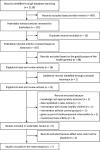Serious games for improving knowledge and self-management in young people with chronic conditions: a systematic review and meta-analysis
- PMID: 26186934
- PMCID: PMC7814922
- DOI: 10.1093/jamia/ocv100
Serious games for improving knowledge and self-management in young people with chronic conditions: a systematic review and meta-analysis
Erratum in
-
Corrigendum to: Journal of the American Medical Informatics Association, Volume 23, Issue 1, 1 January 2016, Pages 230-239, https://doi.org/10.1093/jamia/ocv100.J Am Med Inform Assoc. 2018 Sep 1;25(9):1270-1271. doi: 10.1093/jamia/ocy063. J Am Med Inform Assoc. 2018. PMID: 29850831 Free PMC article. No abstract available.
Abstract
Objective: To conduct a systematic review and meta-analysis of randomized controlled trials assessing the effectiveness of serious games in improving knowledge and/or self-management behaviors in young people with chronic conditions.
Materials and methods: The authors searched the databases PubMed, Cochrane Library, Web of Sciences, and PsychINFO for articles published between January 1990 and January 2014. Reference lists were hand-searched to retrieve additional studies. Randomized controlled trials that compared a digital game with either standard education or no specific education in a population of children and/or adolescents with chronic conditions were included.
Results: The authors identified 9 studies in which the effectiveness of serious games in young people with chronic conditions was evaluated using a randomized controlled trials design. Six studies found a significant improvement of knowledge in the game group from pretest to posttest; 4 studies showed significantly better knowledge in the game group than in the control group after the intervention. Two studies reported significantly better self-management in the game group than in the control group after the intervention. Seven studies were included in the meta-analysis. For knowledge, pooled estimate of Hedges' gu was 0.361 (95% confidence intervals, 0.098-0.624), demonstrating that serious games improve knowledge in patients. For self-management, pooled estimate of Hedges' gu was 0.310 (95% confidence intervals, 0.122-0.497), showing that gaming improves self-management behaviors.
Conclusions: The authors' meta-analysis shows that educational video games can be effective in improving knowledge and self-management in young people with chronic conditions.
Keywords: children; chronic conditions; knowledge; self-management; serious games.
© The Author 2015. Published by Oxford University Press on behalf of the American Medical Informatics Association. All rights reserved. For Permissions, please email: journals.permissions@oup.com.
Figures



References
-
- Van Cleave J, Gortmaker SL, Perrin JM . Dynamics of obesity and chronic health conditions among children and youth . JAMA. 2010. ; 303 ( 7 ): 623 – 630 . - PubMed
-
- Sawyer SM, Drew S, Yeo MS, Britto MT . Adolescents with a chronic condition: challenges living, challenges treating . Lancet. 2007. ; 369 ( 9571 ): 1481 – 1489 . - PubMed
-
- van Staa A, van der Stege HA, Jedeloo S, Moll HA, Hilberink SR . Readiness to transfer to adult care of adolescents with chronic conditions: exploration of associated factors . J Adolesc Health. 2011. ; 48 ( 3 ): 295 – 302 . - PubMed
-
- Audulv A, Asplund K, Norbergh KG . The integration of chronic illness self-management . Qual Health Res. 2012. ; 22 ( 3 ): 332 – 345 . - PubMed
-
- Bodenheimer T, Lorig K, Holman H, Grumbach K . Patient self-management of chronic disease in primary care . JAMA. 2002. ; 288 ( 19 ): 2469 – 2475 . - PubMed

